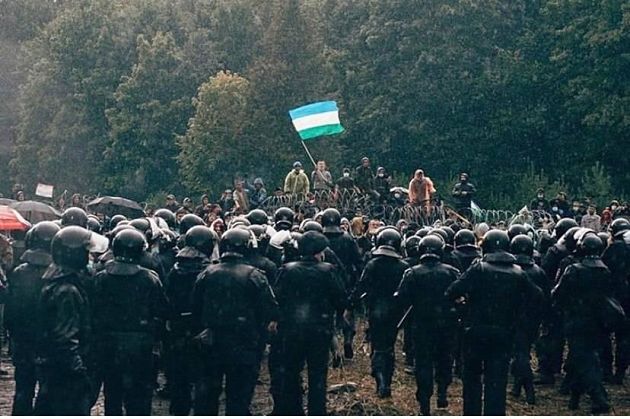On March 9 of this year, “The Voice of Islam” published an article titled “On the Threshold of the New 20s” in which it was discussed that the whole world is entering an era of dramatic changes. Before and after that, we have repeatedly written about the need for Muslims in the Russian Federation to monitor the political processes taking place in the country, especially in the field of protests, and to think about how to play an active role in them instead of becoming victims of political changes.
What happened last weekend in Kushlay, Bashkortostan, is an example of what we call on Muslims to do. After several days of fierce clashes, the defenders of Kushlay were able to force the so-called head of the republic, Radiy Khabirov, to make concessions and declare that the projects that people were protesting against would not be carried out unless a compromise was reached. This shows the importance of Muslims in mobilizing and organizing protests.
On the one hand, as we have already mentioned, this was not a protest based solely on religious grounds, but a protest calling for the protection of the environment, the rights and dignity of the people from the abuses of the authorities and their cronies. This allowed the protest to gain support from people of different nationalities, religious and political beliefs, both in Bashkortostan and beyond. Yuri Shevchuk, Maxim Galkin, lawyer Treshev and several other well-known Russian personalities expressed their support for this protest.
On the other hand, it was Muslim individuals and Islamic mobilization mechanisms that largely ensured the massiveness and militancy of this protest, which made it noteworthy and influential. After the regime forces attacked the defenders’ camp, one of the village’s mosques became the headquarters for their gathering and regrouping. People came there not only from all over Bashkortostan, but also from the Bashkir districts of the Orenburg and Chelyabinsk regions.
Interestingly, the regime’s propaganda tried to use this “Islamic trace” in the protests to instill fear and demonize ordinary people. It was claimed that “Nazis and Wahhabis” had gathered in the camp of the Kushlay defenders, but thanks to the exemplary behavior of the defenders, who emphasized the civic and environmental nature of their protests, as well as their multicultural and non-confessional character, the regime’s propagandists failed to achieve their goals.
As we wrote last time, it is worth noting that the events in Kushlay are taking place in parallel with the events in Khabarovsk, which have overshadowed the revolutionary events in Belarus in recent days. We also wrote about how the religious factor has manifested itself in the recent events. This story continues.
Apparently, the Spiritual Administration of Muslims of Russia (SAMR), which we have often criticized for its ridiculous policy of imitating the Russian Orthodox Church (ROC), read our reproach regarding the last policy of Patriarch Alexy, who called for reconciliation during the civil confrontation in Moscow in 1993, instead of supporting the authorities like his successor, Patriarch Kirill Gundyaev.
It seems that Ravel Gainutdin, SAMR’s self-proclaimed “spiritual leader of Russian Muslims,” has decided to use Gundyaev’s mistake to his advantage. He made a similar call for reconciliation between the conflicting parties in Belarus. However, there are two problems.
First, four days before this appeal, Gainutdin rushed to congratulate Alexander Lukashenko on his election victory. However, the ongoing confrontation in the streets of Belarus is due to the fact that his opponents consider the elections to be completely falsified (given the overwhelming majority of Lukashenko’s opponents in the streets, this is clearly true). By supporting Lukashenko and his falsifications, Gainutdin has firstly denied himself the opportunity to be a neutral arbiter whose calls for reconciliation might be taken seriously by one of the parties.
Second, it is unclear how the self-proclaimed “leader of Russian Muslims” relates to the confrontation in Belarus. They have their own Mufti, Abu Bakir Shabanovich, who made a similar conciliatory statement, which is much more relevant in his case.
But why does the “Chief Mufti of Russia” care so much about what is happening in Belarus, while ignoring key events in the Muslim region of his country, the Republic of Bashkortostan?
In the end, we have a situation where Maxim Galkin supports the demands of Muslims, but not their “Chief Mufti”, who first sent unnecessary congratulations on Lukashenko’s fake victory and then, a few days later, made similarly unnecessary and uninteresting calls for reconciliation.
In conclusion, this incident, in contrast to what has been written about the events in Kushlay, vividly demonstrates the difference between a promising policy for Muslims and its shameful imitation and discrediting. In light of this, Muslims must draw the necessary conclusions in advance, focusing on self-organization, civic participation, and independent authorities, without tying their interests and prospects to those who make even the comedian Maxim Galkin look like a serious public figure.

